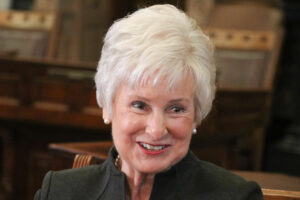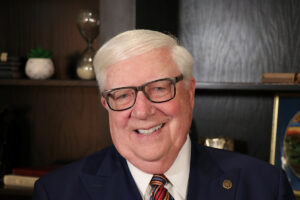Topic: Telecommunication deregulation

Interview of Alicia Salisbury, October 23, 2020
Interviewed by Patty Clark
Former Senator Alicia Salisbury grew up in a political family--both father and grandfather served in the legislature--so her sixteen years of service as a Kansas Senator continued the family tradition. She also was a serious legislator who believed in community service as witnessed by the numerous boards and committees on which she served, both volunteer and elected. Salisbury's driving interests were improving the economy of Kansas and bringing growth in wealth to her community and state. Salisbury's 2020 oral history interview chronicles her work ethic. With her children no longer at home, she had the Show Moretime and the interest to dive into a wide assortment of issues, from workforce development, to interstate banking, to telecommunication reform, to a blue ribbon panel on workers compensation. Salisbury worked long hours and focused on constituent services. She boldly asked for the committees that interested her and championed changes where necessary. Salisbury succeeded in changing the Labor and Industry Committee into the Commerce Committee to handle everything from economic development strategies to workers compensation. She tackled tough issues with a sense of humor and the skills of collaboration learned as a volunteer leader. This interview describes her determination, her commitment, and her legacy to the state of Kansas as Vice President of the Senate. Show Less

Interview of Jim Gartner, February 16, 2024
Interviewed by Chris Courtwright
This interview sheds light on several activities related to the Kansas Legislature, particularly the role of lobbyist in decision making and the role of school boards in governance of education. It begins in 1967 with quite a tale of Gartner's service as a young Marine, wounded in VIetnam and how that impacted his career choices. A brief work experience building tires at Goodyear convinced him to get a college degree. Southwestern Bell Telephone hired him as one of the first male telephone operators in Kansas. He ended up as Vice President of External Affairs many years Show Morelater. He began his lobbying career in 1987 partnered with Denny Koch. Together they helped define deregulation and worked with both the legislature and the Kansas Congressional Delegation. In 2009 Gartner was appointed to the USD 437 school board to fill a vacancy. That's where he learned about school finance and governance. In 2016 Rep. Annie Tietze resigned and Gartner won that legislative seat. The House Taxation Committee was a logical appointment, given his lobbying background. The Brownback Tax Experiment was failing, and the legislature was eager to repeal it. Brownback vetoed the bill passed by the legislature; they quickly overrode his veto and restored more conventional tax policy. The interview concludes with a discussion of the food sales tax exemption proposed by Governor Kelly and Gartner's frustration with the legislative process and how it changed over the 30 years of his involvement. Show Less

Interview of Edward Hammond, April 1, 2025
Interviewed by Mark Tallman
Hammond's interview describes in detail how Fort Hays State University changed and adapted during his 30 year tenure in response to actions of the Kansas Board of Regents and the Kansas Legislature. During that time Dr. Hammond wrote two strategic 10 year plans to accommodate the changing environment for higher education in Kansas. The first plan emphasized "high tech, high touch." The curriculum changed to incorporate technology, even teaching art as graphic design on computers. The goal was for all 1990 graduates to be computer literate, They put computer labs in all the dorms. Show More FHSU had declining enrollments in the 10 years prior to Hammond's presidency. Hammond believed If you are going to move into an institution and make change, select strategies that promote the change. Smaller classes, (high touch) created a distinction with the other schools. The next hurdle was responding to changes in how tuition is applied. In 2000 KBOR changed the formula and now institutions can keep whatever they bring in from tuition. The other change was adding 19 community colleges, Washburn University and the technical schools under the regents' control. The regents emphasized access and serving as many Kansans as they could. FHSU then needed to grow to keep up with this change because funding was based on enrollment. Hammond decided to emphasize distance learning and low tuition to meet these changes. While other schools raised tuition, FHSU decided to be at the low tuition end with a quality product. FHSU moved from "high tech, high touch" to "affordable success" using the distance learning technology to expand their enrollment. Hammond convinced rural telephone carriers to provide mostly free internet services, wired and cellular. By 2010 they had more distance learning than all the other schools combined. They began recruiting Chinese students in 1999--achieving 15,000 students in about 10 years. The China program helped lower the costs for Kansas students. Hammond attributes his success at FHSU to the team of faculty and admininstrators. FHSU is still serving 50% of the high school students despite the loss of population in the western part of the state. The goal is still to grow the university in ways that add value, such as allowing Colorado students to attend as in-state student. Show Less
